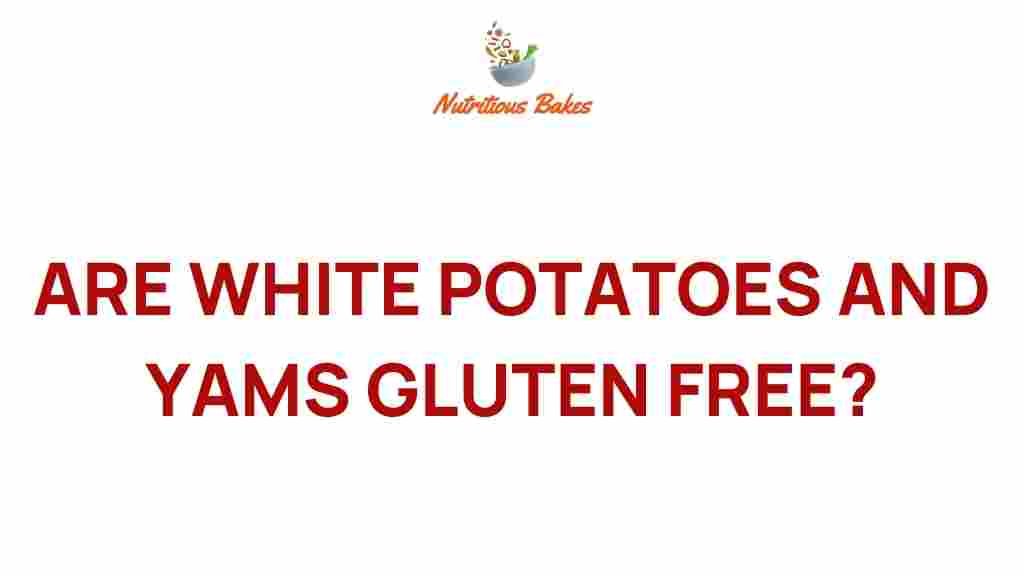The Gluten-Free Dilemma: Are White Potatoes and Yams Safe to Eat?
As the gluten-free lifestyle gains popularity, many people are reevaluating their dietary choices. With a focus on health trends and nutrition, individuals are increasingly turning to root vegetables like white potatoes and yams. However, the question remains: are these staple foods safe for those following a gluten-free diet? In this article, we will explore the relationship between gluten, white potatoes, yams, and overall food safety, helping you make informed decisions about your diet.
Understanding Gluten and Its Effects
Gluten is a protein found in wheat, barley, and rye. For individuals with celiac disease or gluten sensitivity, consuming gluten can lead to a range of health issues, including:
- Digestive problems
- Fatigue
- Joint pain
- Skin rashes
For those needing to avoid gluten, understanding which foods are safe to eat is crucial. This brings us to the topic of root vegetables, specifically white potatoes and yams.
Are White Potatoes Gluten-Free?
Yes, white potatoes are naturally gluten-free. They belong to the nightshade family and are a rich source of carbohydrates, vitamins, and minerals. Here are some nutritional benefits of white potatoes:
- High in vitamin C
- Good source of potassium
- Contains dietary fiber
The key to incorporating white potatoes into a gluten-free diet is to prepare them without adding gluten-containing ingredients. For example, mashed potatoes made with butter and milk are gluten-free, while those made with added flour or glutenous thickeners are not.
Are Yams Gluten-Free?
Similar to white potatoes, yams are also gluten-free. They are often mistaken for sweet potatoes, but yams and sweet potatoes are different species. Here are some health benefits of yams:
- Rich in antioxidants
- High in fiber
- Good source of vitamins B6 and C
Yams can be boiled, baked, or roasted, making them a versatile addition to any gluten-free diet. Just like with white potatoes, it’s crucial to avoid cross-contamination with gluten during preparation.
Food Safety Considerations
When considering food safety in relation to gluten-free diets, it’s essential to be aware of potential cross-contamination. Here are some tips to ensure your root vegetable dishes remain gluten-free:
- Use separate cutting boards and utensils for gluten-free foods.
- Wash root vegetables thoroughly to remove any surface contaminants.
- Store gluten-free foods in separate containers to prevent cross-contact.
Integrating White Potatoes and Yams into Your Diet
When you’re ready to incorporate white potatoes and yams into your gluten-free meals, consider the following steps:
- Choose Fresh Produce: Select high-quality, fresh white potatoes and yams to ensure optimal flavor and nutrition.
- Prepare Properly: Wash and peel (if desired) the root vegetables before cooking.
- Experiment with Cooking Methods: Try different methods like baking, boiling, and roasting to find your favorite way to enjoy these vegetables.
- Pair with Gluten-Free Ingredients: Combine white potatoes and yams with gluten-free ingredients like herbs, spices, olive oil, and gluten-free grains for a balanced meal.
Common Myths About Gluten-Free Diets
As you navigate your gluten-free journey, you may encounter various myths. Let’s dispel some common misconceptions:
- Myth 1: All root vegetables contain gluten.
Fact: Only grains like wheat, barley, and rye contain gluten. Root vegetables like white potatoes and yams are safe. - Myth 2: Gluten-free diets are inherently healthier.
Fact: While a gluten-free diet can be healthy, it depends on the choices made. Processed gluten-free foods can still be unhealthy. - Myth 3: You can’t have starches on a gluten-free diet.
Fact: White potatoes and yams are excellent sources of starch and are gluten-free.
Health Trends and Dietary Choices
In recent years, the rise of health trends has led many to explore gluten-free options, even among those who do not have gluten sensitivities. Some reasons for this shift include:
- Increased awareness of food allergies and intolerances.
- Growing interest in whole foods and plant-based diets.
- The belief that gluten-free diets may aid in weight management.
While there are benefits to choosing a gluten-free lifestyle, it’s vital to ensure that your diet remains balanced and nutritious. Incorporating root vegetables like white potatoes and yams can provide essential nutrients while adhering to gluten-free guidelines.
Troubleshooting Common Issues
As you transition to a gluten-free diet, you may encounter some challenges. Here are tips for troubleshooting:
- Digestive Issues: If you experience digestive discomfort, consider tracking your food intake to identify any potential triggers.
- Feeling Deprived: Explore new recipes and cooking techniques to keep your meals exciting and satisfying.
- Cross-Contamination: Always read labels and choose certified gluten-free products to minimize risk.
Final Thoughts on White Potatoes, Yams, and Gluten-Free Living
In conclusion, both white potatoes and yams are safe and nutritious options for individuals following a gluten-free diet. They offer a variety of health benefits and can be easily integrated into meals. By making informed dietary choices and understanding food safety, you can enjoy these delicious root vegetables without concern.
For more information on gluten-free living and recipes, visit this resource. Remember to consult with a healthcare provider or nutritionist if you have specific dietary concerns.
Embrace the gluten-free lifestyle with confidence, knowing that white potatoes and yams are not only safe but also a delicious part of your healthy eating plan.
This article is in the category Diet and created by NutritiousBakes Team
